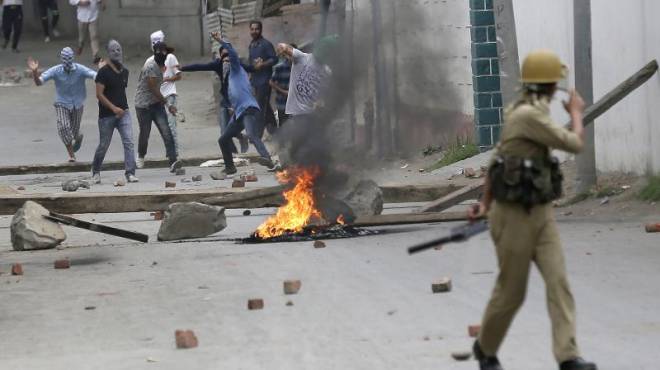Srinagar: “Bhago yahan se” (go away from here) — a voice suddenly booms from a dark corner of a street in curfew-bound Srinagar as dusk falls. This is the voice of a paramilitary personnel behind a Concertina wire who tries to prevent movement of people on the main road here and is unwilling to listen to anyone even if one is carrying a curfew pass or has some emergency.
Srinagar like any other part of Kashmir is witnessing the longest spell of curfew since July 8 when unrest broke out in the Valley. “This has become a daily routine. To walk just across the chowk, which is only 500 metres away, I have to take a detour of nearly two kilometres through narrow lanes and by-lanes to reach my aunt’s place,” says Mushtaq Mir, a resident of Rainawari locality in downtown city.
Mir is carrying some medicines for his aunt who has been suffering from age-related ailments. Changing his path, Mir, accompanied by his wife, finally chose another route to reach his destination but not before a group of young boys try to block his way as he was sneaking from by-lanes.
Armed with ‘lathis’, stones and bottles filled with petrol and kerosene, youngsters will soon inquire every single detail from you and verify everything before letting you go, he said. “The security forces at least give you a chance to retreat while with youngsters that option is also not available and you are allowed to cross only after every detail has been verified,” says his wife.
This broadly is the experience of an average Kashmiri in the Valley today who is caught between security forces and agitating youth with no end to this misery in sight.
Many such harrowing experiences of anguished residents were shared on a quick round of the city. “We are not inhuman but we have to act tough as a preventive measure. In case of a medical emergency, we take care and ensure that the patient reaches the hospital,” says a middle-rung paramilitary officer deployed at Rainawari chowk, who spoke on the condition of anonymity.
The officer reasoned out that in case his men showed leniency “we will see the crowd swelling within no time resulting in clashes and at times in injuries or death. So what’s the harm in taking precautions?”
While life has come to a standstill on the main roads, there is activity in narrow lanes and by-lanes. People are seen busy discussing politics at corner meetings and watching every stranger with suspicion.
In Nowpora, a stranger to the locality was being questioned by a group of youth. The man, whose face had turned red due to ‘civil interrogation’, was frantically looking for his identity card and hospital papers.
His father was admitted to a private hospital in the adjacent Khayam chowk and he had to rush there because of medical emergency. After proving his identity and the urgency, the bunch of youths, who had virtually seized his scooty for a fun ride, took him to a place from where the deployment of security forces was visible. “I had to hurl stones at the CRPF camp after which I was allowed to go,” he said.
“But are there any takers in the state or central government,” asks Inam-ul-haq, a resident of Nowhatta area, who believes that very soon his savings will end.
“I don’t know what to do thereafter. My business will also not pick up immediately even if the situation starts getting better,” Haq, who runs a travel agency, said.

